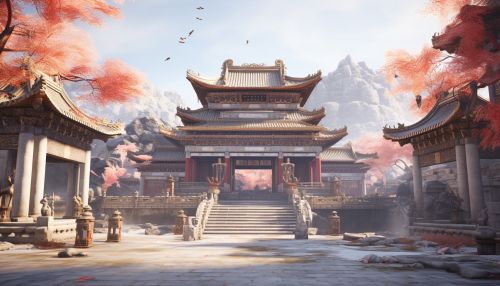Chinese mythology
Origins and History
Chinese mythology is a collection of cultural history, folktales, and religious tradition that has been passed down in oral form or within the written tradition of ancient China. The mythology involves the worship of various gods, heroes, and mythological creatures. The origins of Chinese mythology are difficult to trace due to the age and fragmented nature of the sources, but it is believed to have developed over a period of more than 3,000 years.


Mythological Figures
Chinese mythology is populated by a vast array of mythological figures, from gods and goddesses to heroes and mythical creatures. Some of the most well-known figures include Pangu, the god who created the universe, Nuwa, the goddess who created humanity, and Sun Wukong, the Monkey King. These figures often have complex and multifaceted roles within the mythology, embodying various aspects of nature, morality, and human experience.
Cosmology
Chinese cosmology, which is intertwined with Chinese mythology, is a complex system of beliefs that relates the patterns of the natural world to the organization of the social world. It is based on the concept of Yin and Yang, the two opposing and yet complementary forces that make up all aspects of life. The cosmology also includes the theory of the Five Elements, which are believed to be the fundamental elements of the universe.
Mythical Creatures
Chinese mythology features a variety of mythical creatures, each with its own unique characteristics and symbolism. These include the Chinese dragon, a symbol of power, strength, and good luck, and the Chinese phoenix, a symbol of high virtue and grace. Other mythical creatures include the Qilin, a creature of good omen that signifies serenity and prosperity, and the tortoise, which is a symbol of longevity, power, and tenacity.
Mythology and Religion
Chinese mythology is closely tied to the three main religions of China: Confucianism, Taoism, and Buddhism. These religions have influenced and been influenced by the myths, and many of the mythological figures and stories have been incorporated into religious texts and practices.
Influence on Culture
Chinese mythology has had a profound influence on Chinese culture, shaping its literature, art, and philosophy. The myths have been the source of inspiration for a vast body of literature, including the famous works of the Four Great Classical Novels of Chinese literature. They have also influenced the visual arts, with mythological figures and scenes being common themes in Chinese painting and sculpture.
Modern Interpretations
In modern times, Chinese mythology continues to be an integral part of Chinese culture. It is frequently referenced in popular culture, including films, television shows, and comic books. Modern interpretations often blend traditional mythological elements with contemporary themes and issues, reflecting the evolving nature of the mythology.
